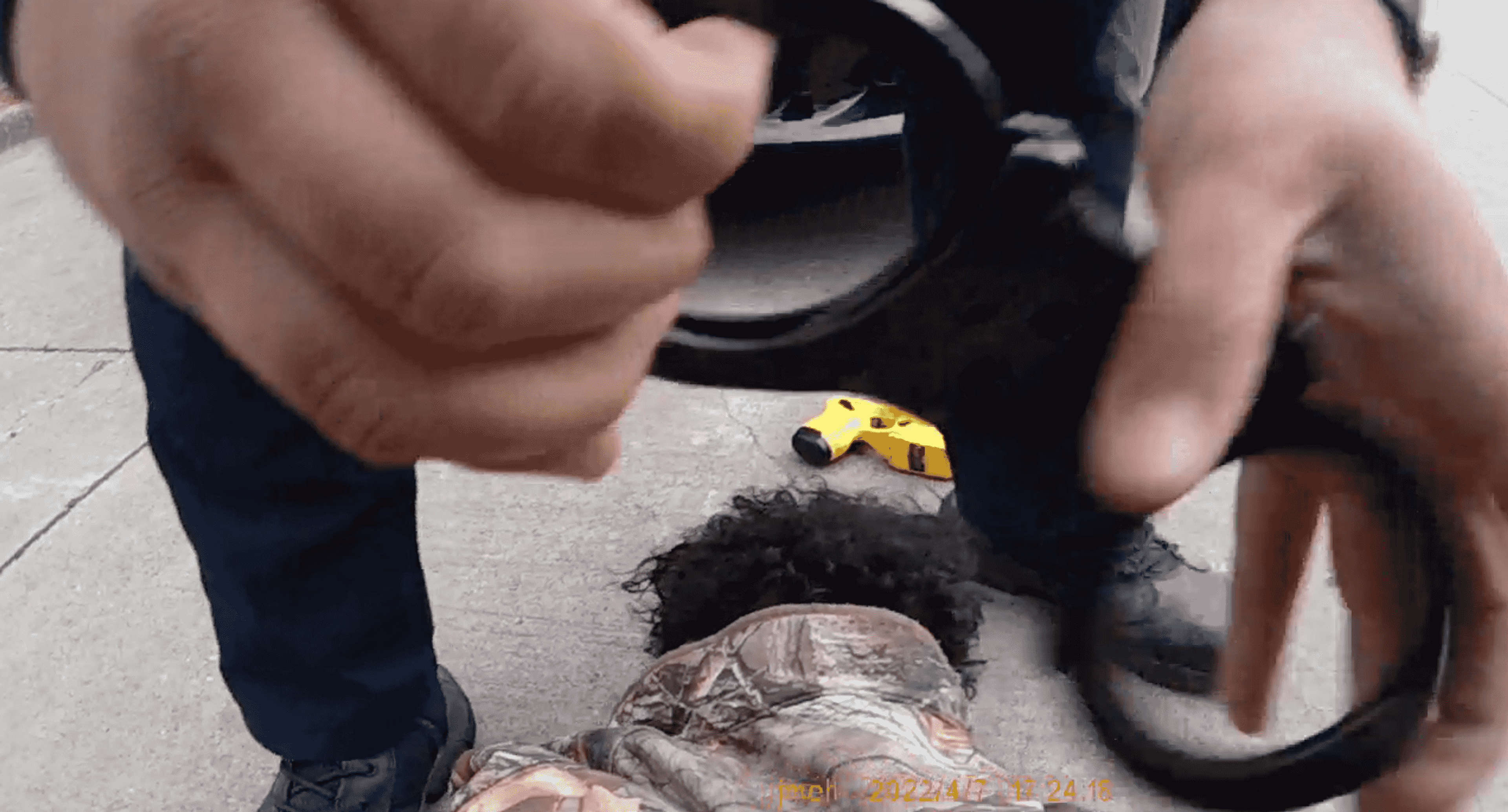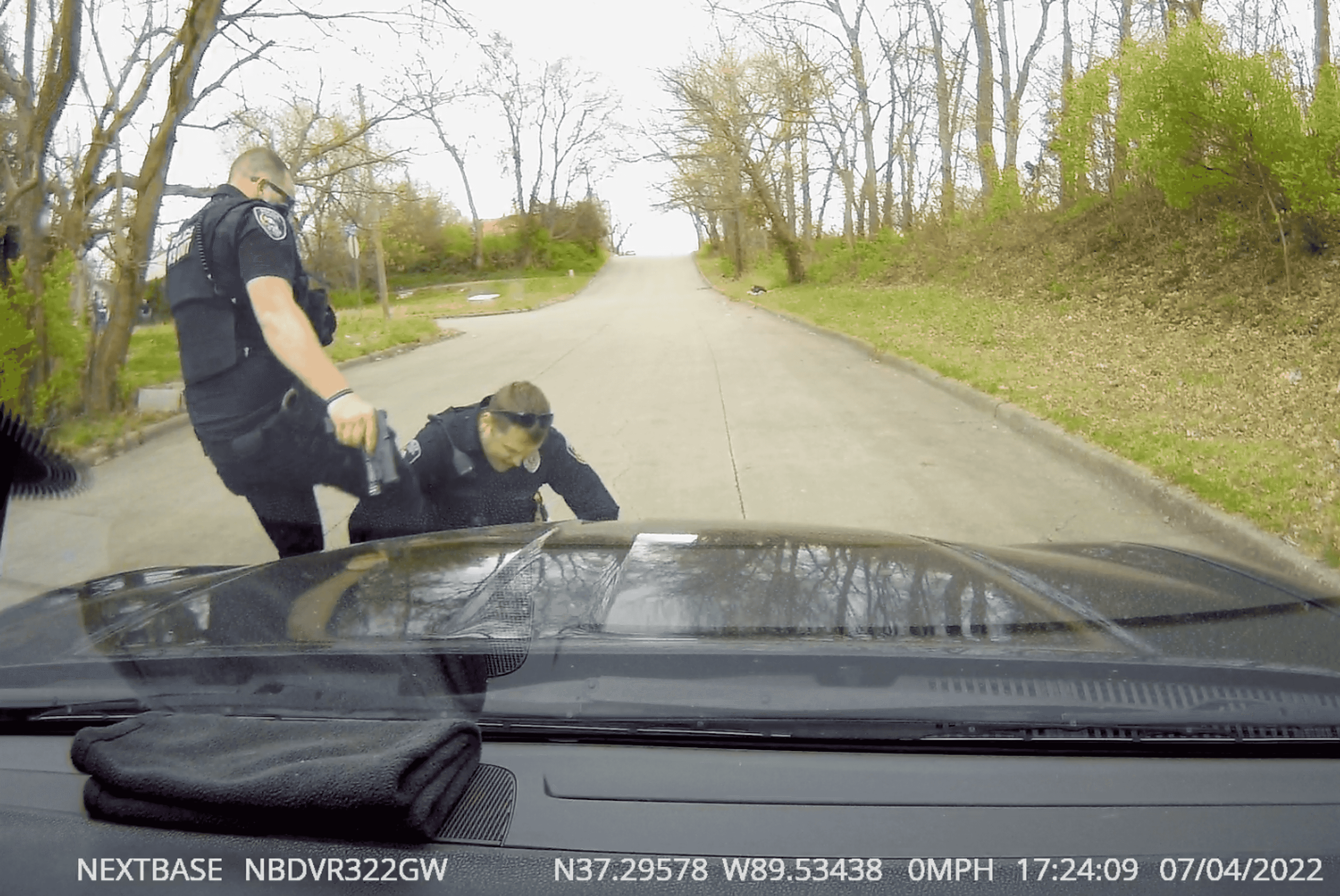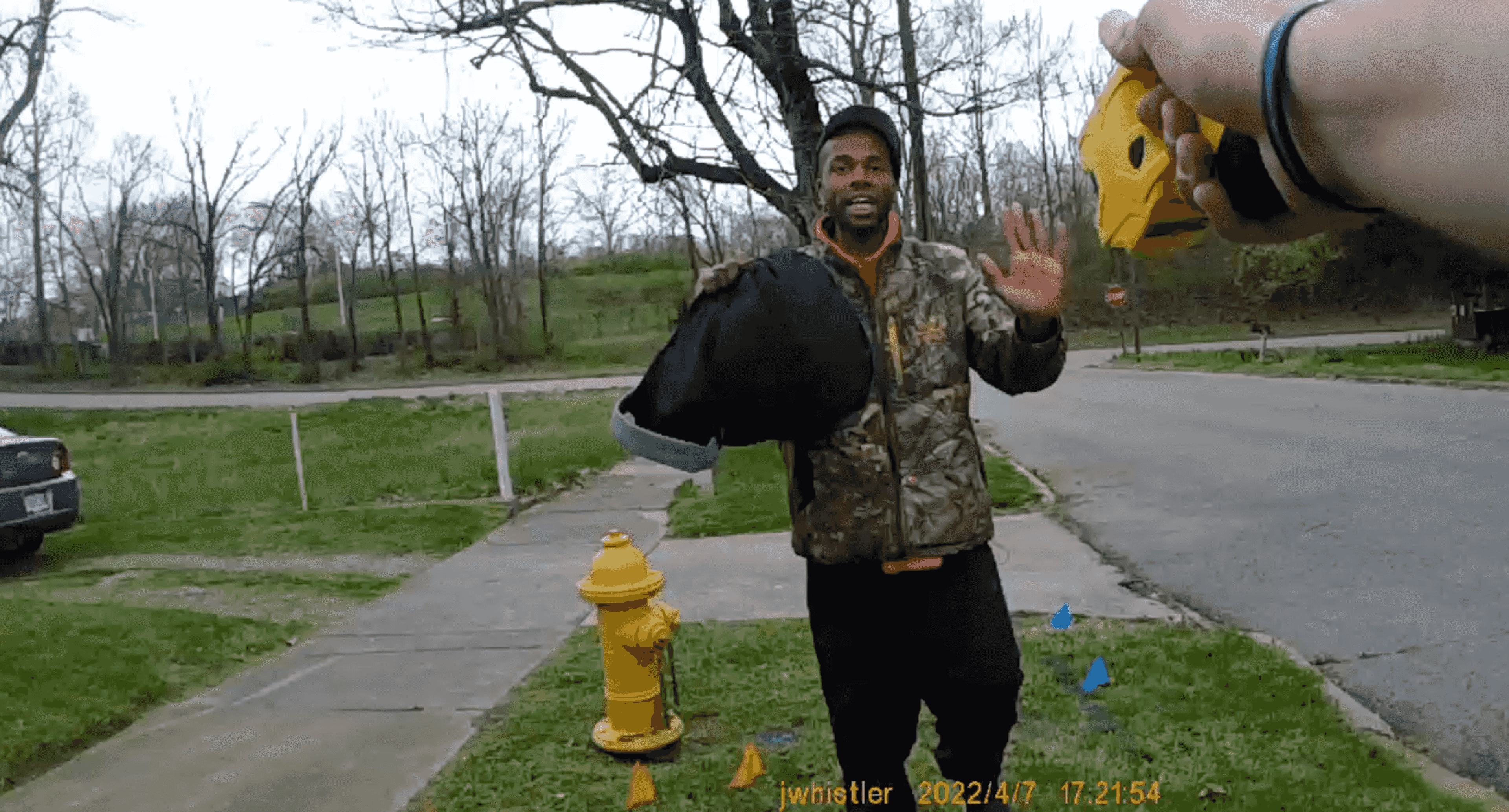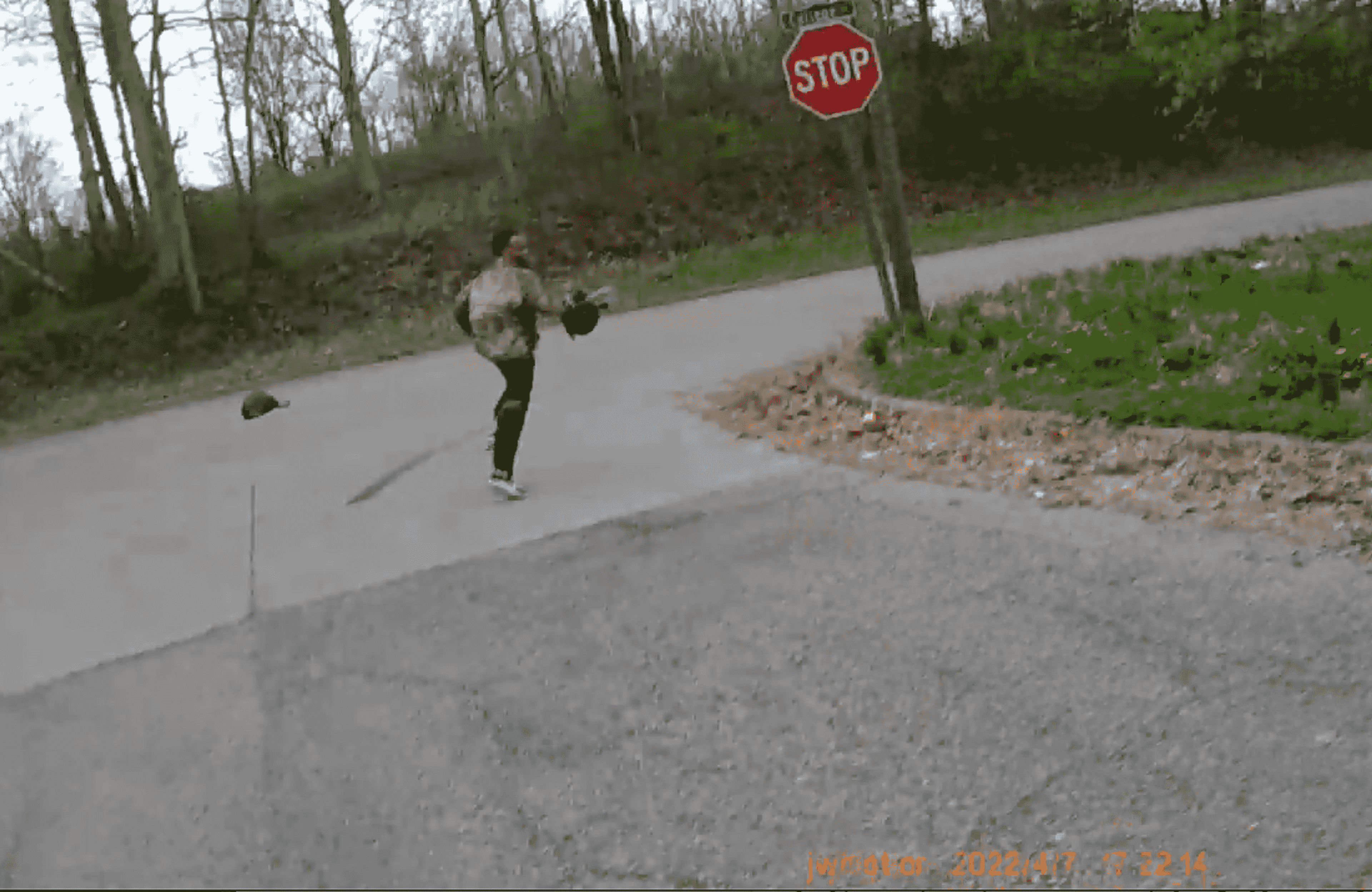Alleged excessive force incidents lead to settlement payouts for City of Cape
Cape Girardeau faces scrutiny after settling two excessive force cases for nearly $200,000, with a third trial pending. Allegations involve officer Joseph Whistler. A 2021 state law complicates transparency and accountability.
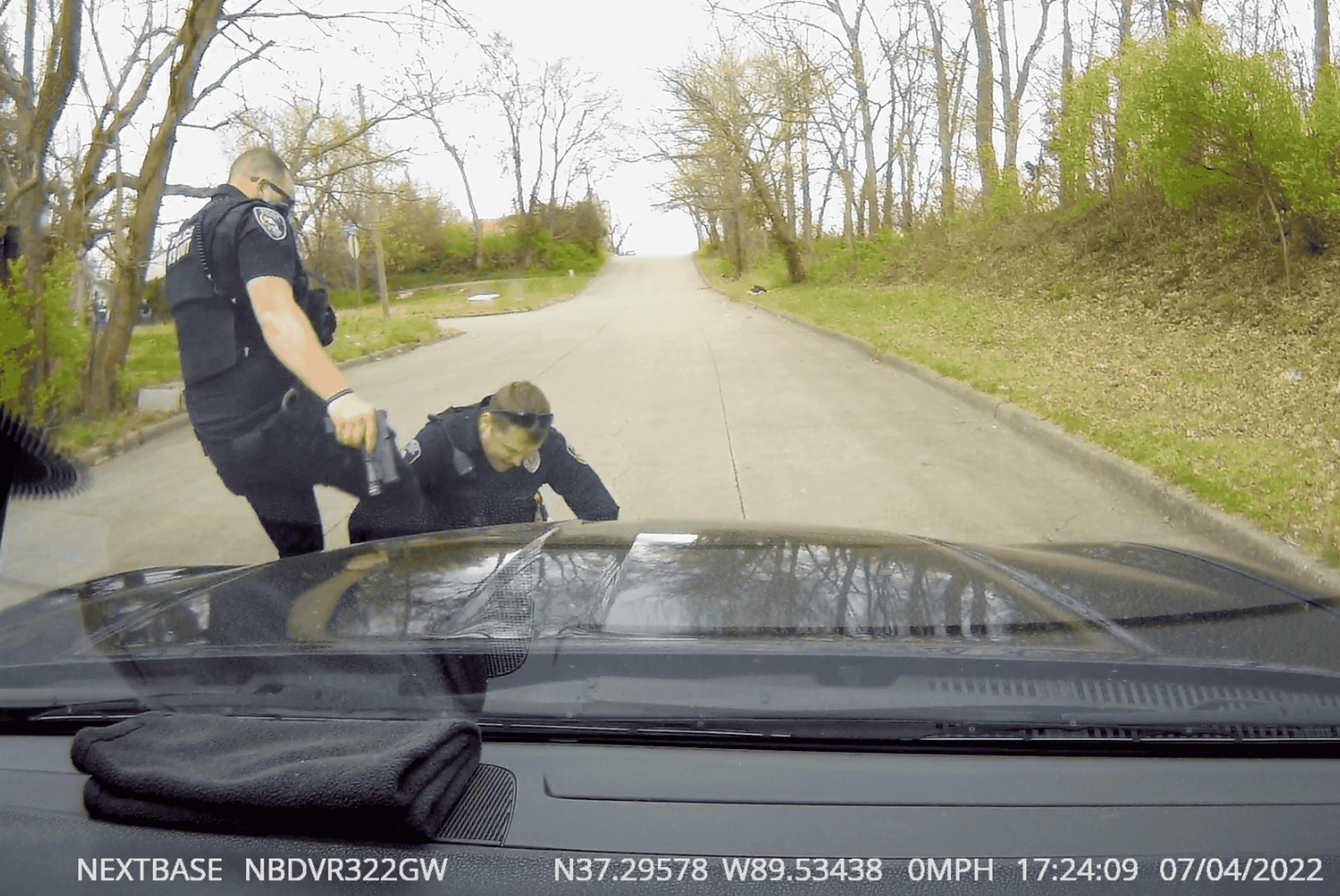
The City of Cape Girardeau has agreed to pay nearly $200,000 to settle two lawsuits involving alleged excessive force on the part of police department officers and is facing a third trial after mediation efforts failed.
The most recent settlement, reached in July, was for $95,000 and was brought by Robert Teater. The other settlement, reached in 2023 for $100,000, was brought by Ryan Mosley.
In May, mediation between Lloyd Gilmore and the City failed to produce a settlement. Gilmore filed a federal civil rights complaint after an altercation with police in 2020.
The settlements — and other allegations of excessive force against officers with the department — involve officer Joseph Whistler, a four-year veteran on the force, among others.
Police officials, including former chief Wes Blair, contended the officers did not violate policy, though noting they may have themselves handled matters in a different, less-violent way.
Representatives of the complainants said the police actions went too far.
Complicating the issue is a 2021 state law dubbed a “bill of rights” for law enforcement officers that shields public release of information in alleged instances of excessive force. The law also requires the employer to legally defend an officer in court on a civil case unless the officer is convicted or pleads guilty to a crime. It lays out a series of thorough procedural steps when misconduct investigations begin and gives officers more standing to file lawsuits against their employer.
Advocates say the law was established to provide similar privacy as other public employees, whose disciplinary records are also not public; and give officers more employment protections, which are not offered to other public employees.
Opponents, including some municipal leaders across the state, say the law prohibits urgent personnel decisions that could normally be made in an at-will state such as Missouri, and that it removes transparency relating to officer behavior and accountability.
Richard Sheets, director of the Missouri Municipal League, a not-for-profit association that advocates for city governments before the Missouri General Assembly, said the law has raised issues among city leaders in Missouri.
“It’s difficult now to terminate police officers because they’ve got to go through a bunch of steps,” Sheets said. “It prolongs it, and it makes it easier for officers to bring federal lawsuits."
One of the provisions that has come under scrutiny requires that the officer be given 24 hours’ notice before he or she can be interviewed as part of the investigation. During that time, the officers are entitled to read and review the complaint, including the name of the person who instigated it. The law lists 14 conditions under which supervisors must conduct interviews.
Law enforcement officers who are suspended without pay are entitled to a due process hearing, for which 12 additional conditions are listed.
The entire record of the due process hearing is required to remain confidential and not subject to the state’s open records law, except by lawful subpoena or court order.
The law says that an officer’s employer must “defend and indemnify law enforcement officers from and against civil claims made against them in their official and individual capacities if the alleged conduct arose in the course and scope of their obligations and duties as law enforcement officers.”
The rule does not apply if the officer has pleaded guilty to or has been convicted of a crime, but it’s exceedingly rare that a police officer is charged or convicted of a crime for use-of-force events while performing duties as an officer.
In addition to the law requiring employers to provide legal defense, it also contains a provision that if the employer doesn’t meet the requirements of the section, the officer has the right to sue the employer.
Legal observers have noted that the mandated legal defense raises questions about whether an employer should discipline the officer at all while the officer faces excessive force litigation, a process that can take years.
Barry Hovis, a state representative who voted for the measure and is also a former officer with the Cape Girardeau Police Department, said the legal requirement intends to make sure employers don’t cut loose an officer to avoid liability when he hasn’t done anything wrong.
“You want to make sure that if the officer acted appropriately, but the agency then may say, 'Wait a minute, this is a big deal. He's not guilty of anything, but I don't want to pay $500,000, so we're just going to get rid of this officer because … we don't want to pay for those attorney fees.' They get rid of him because of that, and then it's dumped on the officer alone when he may not have been found guilty or even had an award levied against him. I think this was just making sure that there is a clear-cut way to handle that."
The City of Cape Girardeau cited the law enforcement bill of rights when it denied a portion of the Southeast Missourian’s requests for records of alleged excessive force by police officers. The newspaper sought investigative records of complaints to the department or in other use of force incidents to understand how the city reviewed claims of misconduct, including those where the city has settled lawsuits.
Certain documents, such as citizen complaints, body worn camera footage and copies of policies were released by the city in accordance with the state’s open records law. Had the city provided the internal documents, officers mentioned in the reports would all have grounds to sue the city.
First case
Mosley’s lawsuit stemmed from an alleged trespassing incident.
Mosley, diagnosed with schizophrenia according to the lawsuit, was accused of trespassing April 7, 2022, at a home on Hanover Street.

When Whistler arrived, Mosley was talking with the complaining caller and another female, according to the complaint and verified by Whistler’s body camera footage. The caller told Whistler that Mosley had attempted to open the door to her residence. Mosley told the officer he was talking to the caller and had only opened the outer door to knock on the primary door, according to the lawsuit.
The residents at the home told Whistler they wanted to pursue trespassing charges against Mosley. According to internal documents obtained by the Southeast Missourian but not from the city, police were familiar with Mosley. A lieutenant with the department, who was involved in an internal investigation, told a law firm that he had in previous circumstances tried to find housing for Mosley, who was occasionally homeless. He said he was unaware of Mosley ever being violent.
Once the residents told Whistler that they wished to file trespassing charges, the officer drew his Taser from his holster and demanded Mosley get on the ground. Mosley, who had a prior physical altercation with police in October 2021, began backing away from the officer.
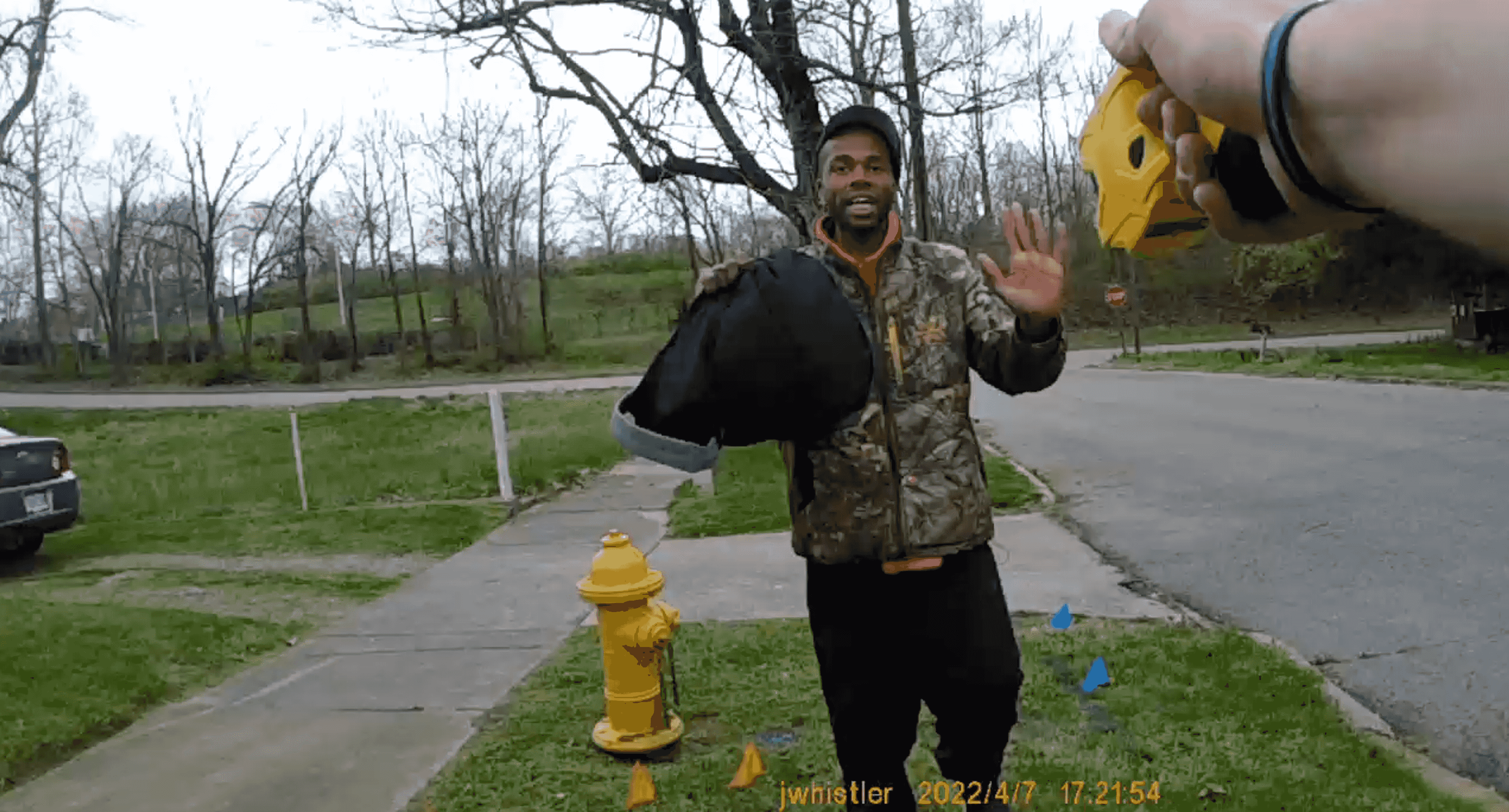
“Do it now, or I’m going to release my dog, and he’s going to bite the (expletive) out of you,” Whistler said.
“Sir, please, sir,” Mosley responded as he continued to back away.
Whistler continued to order Mosley to get on the ground.
“Sir, can you stop, please? I am not hurting them, sir. Can you please stop?” Mosley said.
At that point, Whistler engaged the Taser.
The lawsuit, filed by attorney Derrick Williams, claims Mosley was fearful of Whistler because of the previous altercation where Whistler fired his Taser into Mosley, who fell to the ground. In the prior instance, Whistler drive-stunned — stunning someone by touching the device directly to someone’s skin — Mosley several times in the buttocks while officers subdued him, the lawsuit claims.
In the April 7, 2022 incident, Mosley backed away, using his backpack to protect himself from Whistler’s Taser.
Whistler fired a second Taser projectile at Mosley, but Mosley raised his backpack, and the projectile stuck in the bag. Mosley then dropped the backpack and ran. Whistler chased him for about a block, when Mosley got on one side of a vehicle that had stopped in the road. The vehicle began to drive away, and Mosley ran a short distance before stumbling to the ground.
At that point, Whistler jumped onto Mosley’s back and pinned him to the street. Around that time, officer Josiah Mehl arrived and jumped onto Mosley’s back, according to Mehl’s body camera footage.
The officers ordered Mosley multiple times to give up his hands, but he did not comply.
While Mehl kept his knee on Mosley’s back, Whistler punched Mosley.

According to the lawsuit, Mehl was struggling to get Mosley in cuffs. Whistler pointed his gun at Mosley’s head and shouted “Give him your (expletive) hands.”
Mosley did not stop resisting until Whistler kicked him in the face, visible from Mehl's body cam video.
According to the lawsuit, Whistler “without provocation, and while pinned face down prone on the ground by the weight of Defendant Mehl, Defendant Whistler, with all his might and forced kicked Mr. Mosley directly in the side of his face and head and shouted, ‘You mother(expletive).’”
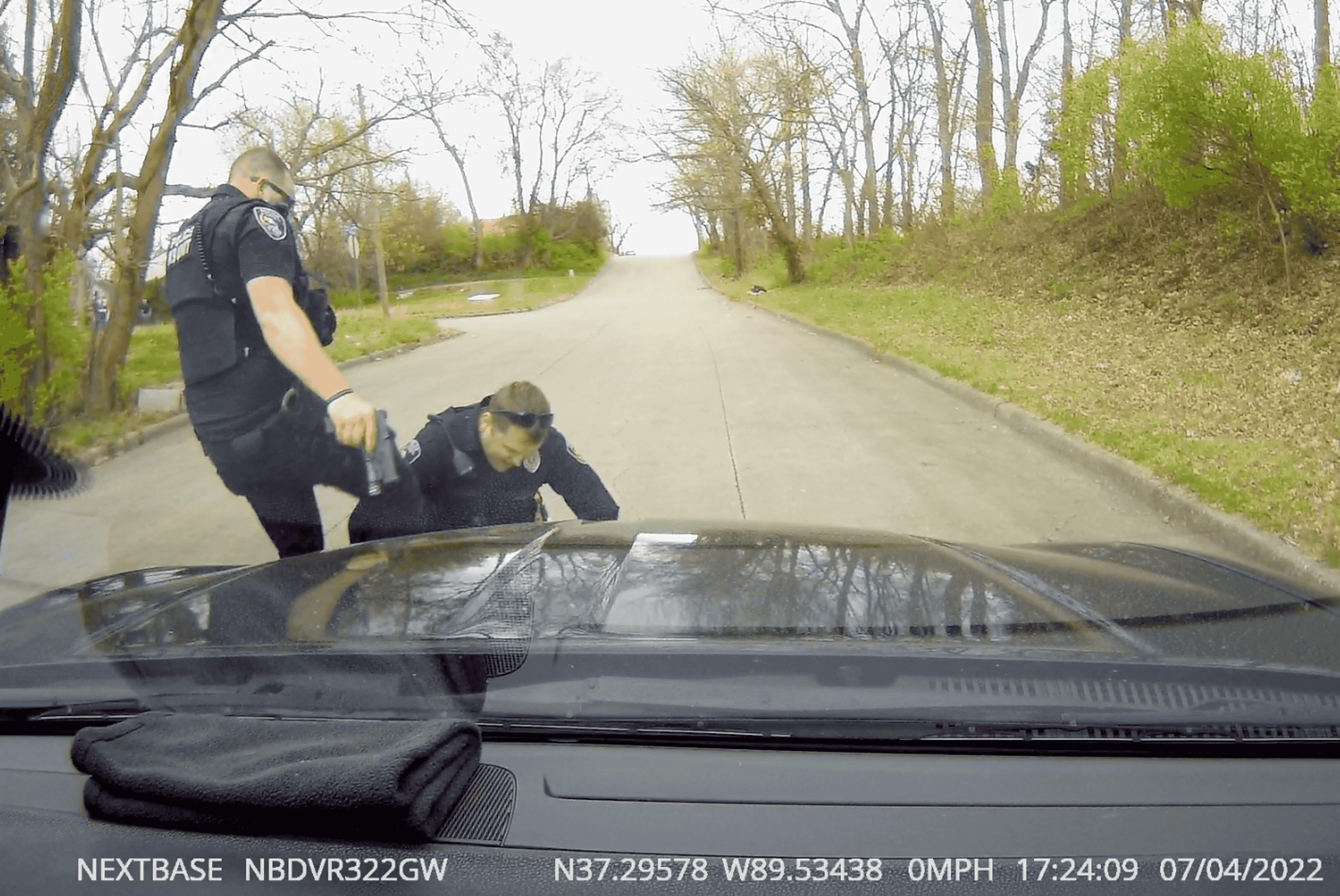
Mosley immediately stopped resisting. The video shows his face bleeding on his cheek and his lips, with a small pool of blood on the street. Paramedics were called to the scene, and Mosley was taken to a hospital for his injuries.
The kick caused fractures to Mosley’s left zygomatic arch and his left mandible. He incurred nearly $21,000 in medical service expenses.
“At all material times, defendant Whistler did not have a reasonable fear of imminent bodily harm when he kicked Mr. Mosley in the face and head … nor did he have a reasonable belief that any other person was in danger of imminent bodily danger from Mr. Mosley,” the lawsuit states.
The Southeast Missourian requested all camera video from that conflict. Images show a gash above his right eye and in the middle of his forehead as he was booked into jail, injuried he did not have previous to the altercation.
Internal investigation
Documents obtained by the Southeast Missourian, but not released by the city, show that an internal investigation was conducted by a law firm that specializes in labor and employment law.
“Mr. Mosley engaged in feigned compliance during this struggle,” the internal investigative report said. “The footage is clear that he was not complying with Officer Whistler and was instead moving to avoid being restrained; however, he was repeatedly stating that he was complying.”
The report states that each strike delivered by Whistler was an attempt to achieve compliance. “Mr. Mosley continued to struggle with his arms back toward Officer Mehl. Whistler then kicked Mr. Mosley in the head.”
A lieutenant arrived at the scene, and asked if Whistler had been assaulted.
“Yeah I mean, he was throwing elbows and (expletive), but just hit my shoulder, not my face,” Whistler stated.
Whistler stated during an internal investigation interview that during the initial struggle, Mosley kicked him in the groin and attempted to grab his service weapon, details he did not divulge at the scene to his lieutenant, but only after he was being investigated by the law firm.
Mehl’s bodycam video does not show Mosley striking Whistler in the groin, but the footage does not show the entirety of the altercation. The bodycam was blocked as Whistler tackled Mosley to the ground. At one point, the camera fell off and landed on the ground. Video taken from Mehl’s police vehicle dash camera shows Mosley's legs and arms flailing.
The report stated that chief Blair did not originally review the bodycam footage before approving the use of force report, but did watch them later, and added that Whistler’s use of force was within policy.
The report stated, “Chief Blair stated that he would like to think he would have approached the situation differently from a tactical standpoint to avoid striking Mr. Mosley in the head (such as by assisting Officer Mehl in restraining Mr. Mosley), but also stated that he believed that Officer Whistler acted reasonably considering the continued resistance by Mr. Mosley, officer Whistler’s level of exhaustion, and officer Whistler’s asserted belief that Mr. Mosley could be trying to disarm officer Mehl.”
Another officer agreed with Blair’s assessment, saying though Whistler was within policy, he would have attempted to restrain Mosley with Mehl and tried to overpower Mosley rather than kicking Mosley in the head.
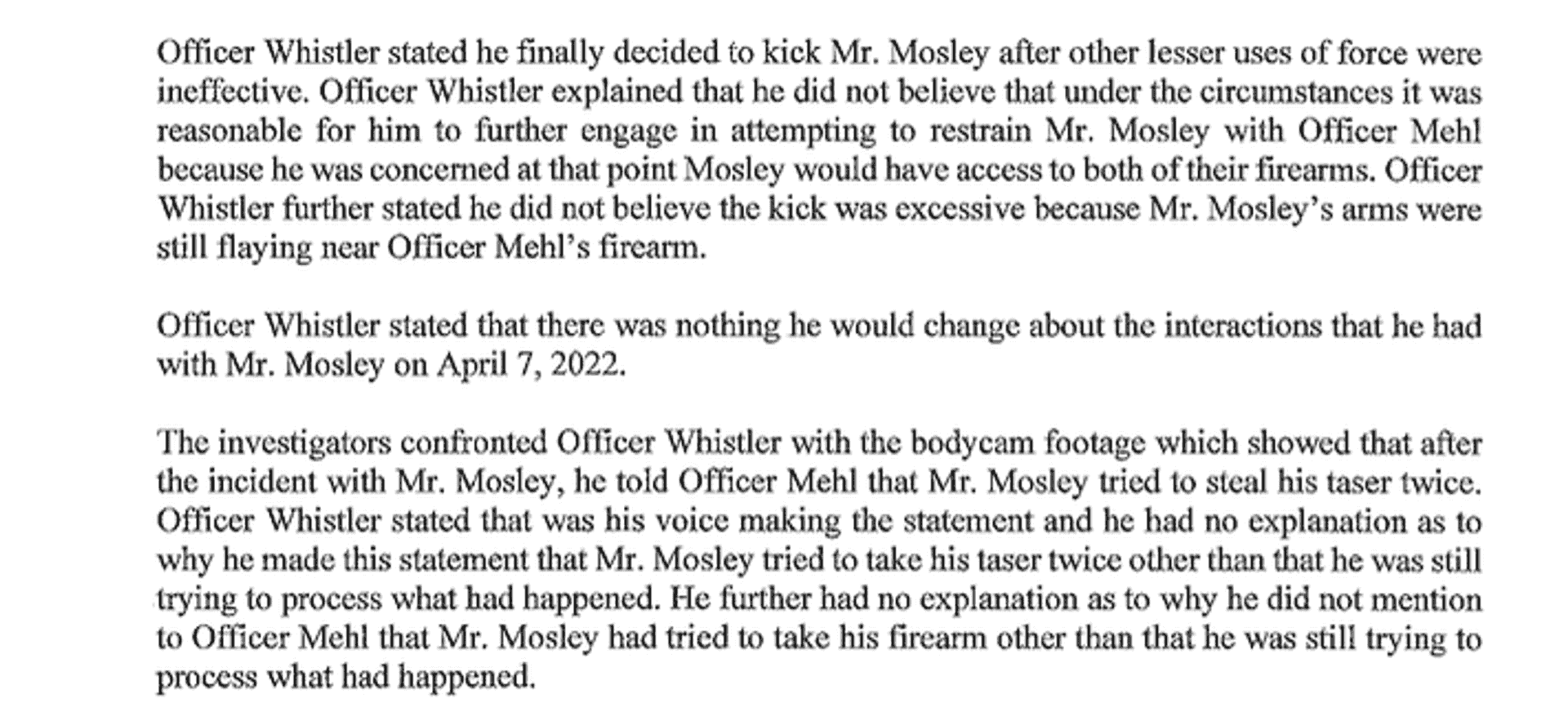
One lieutenant told the law firm that Whistler “was a very proactive police officer who puts himself in the action and that while he may have more use of force events than another officer, he believes it is because of the proactive nature of Officer Whistler’s policing efforts …”

Immediately following the altercation, Whistler could be heard on video saying that Mosley tried to steal his Taser twice. The video does not support that assertion, the internal report said, and Whistler told the law firm that Mosley did not attempt to take his Taser.
The report stated that Mehl told the law firm that at no time did Mosley attempt to grab his service weapon or Taser and that he never observed Mosley attempt to grab Whistler’s gun or Taser.
Investigator comments
In the report, the investigator wrote that Whistler said he was exhausted from the foot pursuit and physical scuffle, and said he felt he could not continue to fight. Whistler stated there was nothing he would change regarding the conflict with Mosley.
Ultimately, the law firm’s investigation found that Whistler’s actions fell within the police policy because of Whistler’s frame of mind. “Even if the investigators had found Mr. Mosley to credibly state that he did not try to disarm officer Whistler, the fact remains that we have concluded that Whistler perceived that Mr. Mosley did make such an attempt, which places his subsequent conduct of tasing Mosley and kicking him in the head when he saw Mr. Mosley’s arms moving toward officer Mehl’s utility belt as reasonable under the policy.”
The firm recommended that Whistler return to work on a performance improvement plan, to receive “additional training in techniques and strategies for interacting with the public, including … evidence gathering, verbal contacts, de-escalation and use of force/defensive tactics/restraining offenders.”
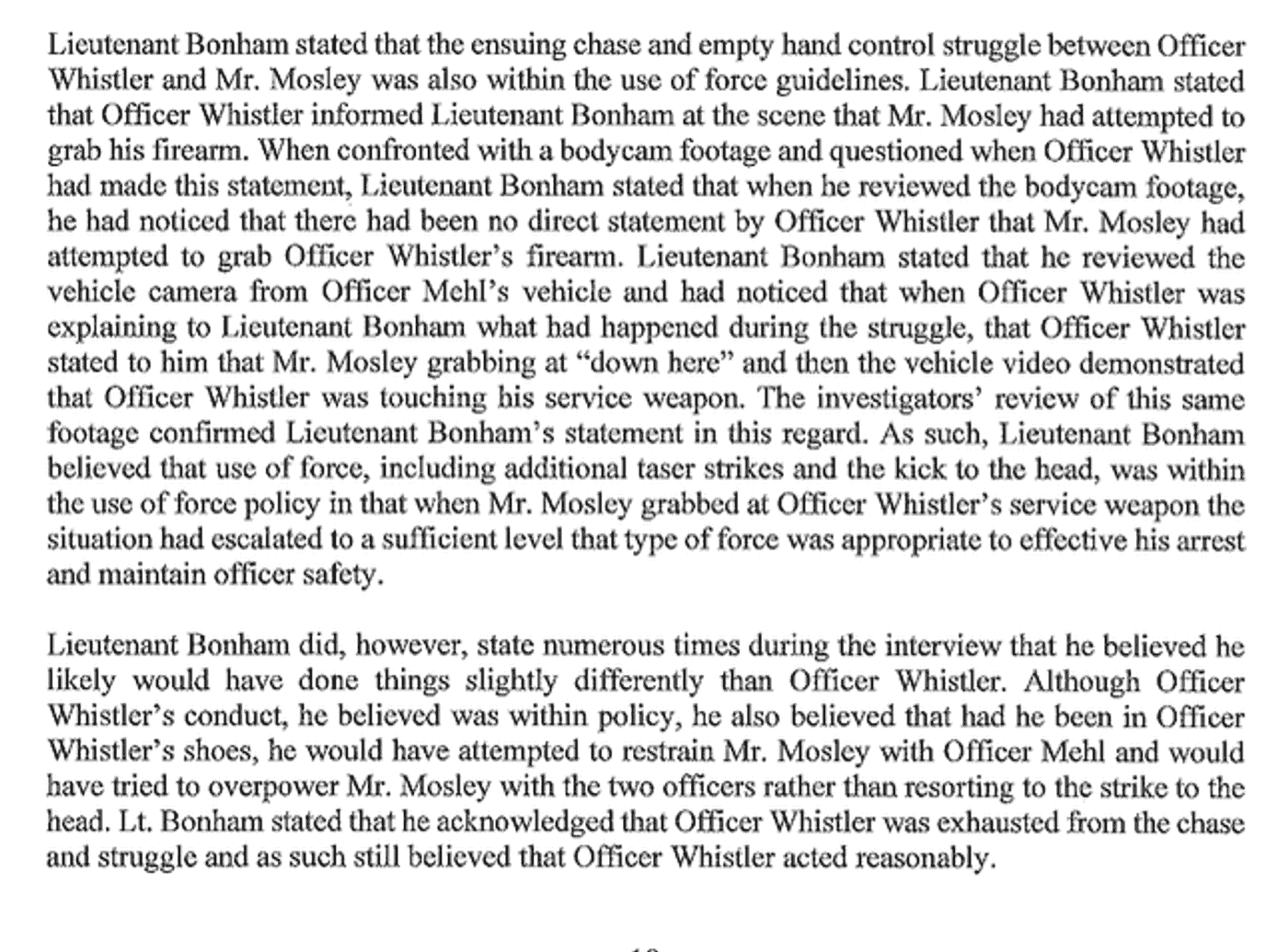
It was further recommended that Whistler only return to the street with a training officer, until the training officer was satisfied with the competency in those areas of training.
The city’s report recommended that sessions on de-escalation and defensive tactics be conducted and mandatory for all patrol officers.
“The common thread from my review of the dashcams or body cams is the abandonment of de-escalation,” Williams, the attorney, said. “And the standard of reasonableness … is it reasonable to kick him in the head? You know, is it reasonable to drop a knee from a standing position into the back of (someone’s) head and smash his face into the concrete? Is it reasonable to Tase a dude in the back of the head when the instruction manual says don't do that? That's what I think the common thread is — the unwillingness to de-escalate this situation.
“I think we're going to wind up with a dead person in this city, because that's the logical conclusion if things don’t change.”
Second case
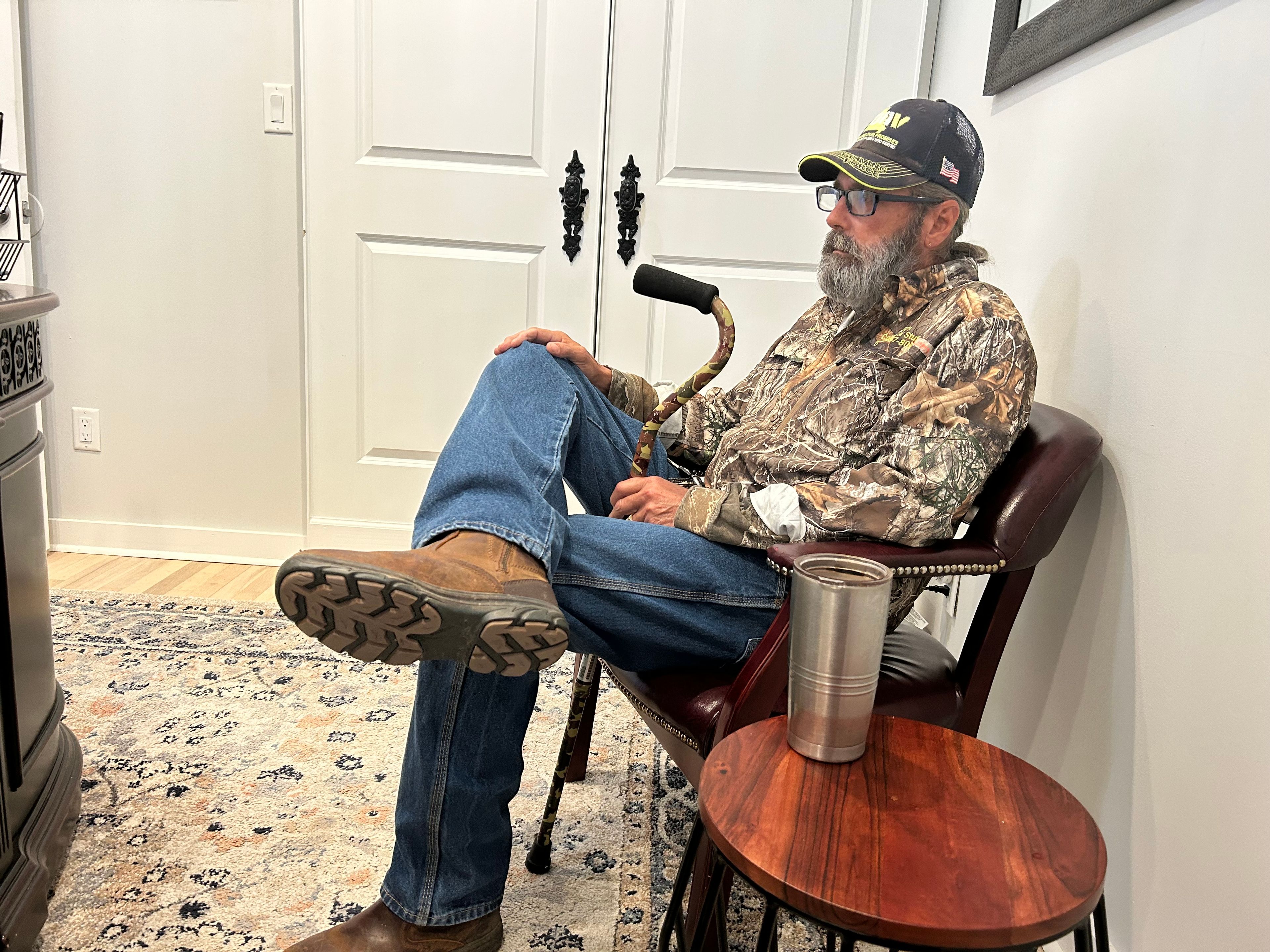
Teater’s suit came after a confrontation with police that occurred March 16, 2021.
He was at his home on Rivercrest Drive with his wife. The military veteran with PTSD — and enough DWI convictions to brand him a felon — had been drinking and walking around inside the home with a firearm, which scared his wife. She called police.
When the first officers arrived at Rivercrest Drive, Teater stuck his head out the front door and yelled profanity at them.
The then-62-year-old man retreated inside, into his man-cave garage, where he typically watches his big-screen TV. He placed the gun on a shelf and looked out the back door.
Teater's wife explained to an officer at the front of the house that her husband had been expressing paranoid thoughts that people were out to get him.
Bodycam footage obtained by the Southeast Missourian through a public records request shows Teater complying with an officer’s commands as he exits the house.
“Hands! Hands! Hands! On the ground!” an officer shouts as Teater steps outside.
The video shows Teater raising his hands.

“Get on your knees right now!”
“Yes sir,” Teater says.
“On your knees!”
“I’m going to my knees,” Teater says. “I have a bad knee. My wife is trying to kill me.”
Teater moves gingerly to the ground and keeps his hands in the air.

At this point, officer Johnny Spencer moves around the corner of the house toward the area where Teater is kneeling. The video shows Teater from a distance on his knees, and about ready to be cuffed until Spencer places his hand in front of the camera, blocking the view. The lens is blocked for about 7 seconds, obstructing the moment the officers tackle Teater. The view of the tackle is not clear on any of the officers’ body cameras.
Another body cam angle, just before Teater was tackled, shows an officer grabbing Teater’s right hand, and pulling it behind his body. As he is being cuffed, Teater is tackled from behind. The lawsuit states that Whistler, Spencer and two other officers made impact with Teater.
Officers scuffled with Teater for a few moments, as he complains about pain in his ribs.

Moments later, an officer explains to another officer: “We came out, we yelled. I came up. Approached the south side of the window frame. He stepped out. We ordered him down to his knees. He turned and faced me. He literally went straight down to the ground right there, and that’s when you guys came around and jumped him. His hands were clear the whole time. So if there is a weapon, it’s going to be inside somewhere. … His hands were clear when he came out.”
Teater was transported to Saint Francis Medical Center for his injuries. When officers pushed down on his back, they broke four ribs, causing a 2 mm lung puncture. He was released a day later, and then billed $37,507 for medical services rendered, according to the lawsuit.
Teater doesn’t deny the reasons for why the officers were there.
But once he put his weapon away and stepped outside, he says he did as he was told.
“I did every command,” he said. “Ray Charles could have seen I had no weapon.”
Teater was charged with three crimes: Unlawful possession of a firearm, unlawful use of a weapon, and resisting/interfering with an arrest, detention, or stop. As part of a plea deal, Teater pleaded guilty to the firearm and resisting arrest charges, but the unlawful use of weapon charge was dropped.
The lawsuit, filed in August of 2023, named officers Cody Farrow, Mehl, Spencer, Nicholas Mayberry, Whistler, Scott Droddy and the City of Cape Girardeau as defendants. The lawsuit was filed in federal court, due to its claims of constitutional violations. The lawsuit made three claims: it accused the officers of violating Teater’s Fourth and 14th Amendment rights, which address searches and seizures and due process of law; it alleged what’s known as a “Monell Liability” claim that officers injured Teater with “deliberate indifference” and deprived him of his rights partly due to the city’s policies and customs; and thirdly, the lawsuit alleged a “Canton Liability” in claiming that the city has not properly trained its officers.

The lawsuit sought compensatory, special and punitive damages, as well as the appointment of a “receiver or similar authority to ensure that the City of Cape Girardeau properly trains and supervises its law enforcement officers.”
In order to settle the two lawsuits above, the City of Cape Girardeau paid out $195,000. The amount does not incude other legal costs — or the impact on city insurance, which has increased because of the lawsuits.
Third case
Gilmore’s situation stems from an incident at West Park Mall. The incident began with reports of an assault at the mall. Police responded and found Gilmore, who they said matched a description of an alleged assailant.
Gilmore claims two officers Tased him 20 times and beat him while he was handcuffed and shackled.
Though charges against him were later dropped, Gilmore served more than two and a half years in jail while the case was pending.
Gilmore’s complaint seeks $700,000 in damages and $60,000 in child support.
Other cases of alleged excessive force have been reported. An officer Tasered a woman in her kitchen after she turned to call a lawyer instead of complying with his command to exit her residence. After a man ran from police, officers tackled him and Tasered him twice, and then an officer dropped his full weight on the man’s neck, smashing his face into the round. Another man who had evaded police in his vehicle for a time, got out of the vehicle and lay prone on the ground while an officer stunned him on the back of his neck before handcuffing him.
The cases occurred in a span of 13 months — from March 16, 2021, to April 7, 2022.
Chief’s perspective
Then-chief Wes Blair declined to be interviewed regarding the Southeast Missourian’s investigation into use-of-force incidents brought to the newspaper’s attention. He did, however, respond in writing to a few questions about policy.
Citing the city attorney’s recommendations, city manager Dr. Kenneth Haskin also declined to comment on the videos obtained by the newspaper, other than to say the city would provide a “robust defense” to officers facing lawsuits, per the law’s requirements.
In his responses on policy, Blair noted that the justification for officers using force is “complex” and “nuanced.”
The Cape Girardeau policy for use of force states:
“Officers shall use, or permit to be used, only that force which is reasonable to effect an arrest, restrain or subdue an individual resisting a lawful seizure, or protect themselves, others or property from harm. The ‘reasonable’ standard allows for the fact that officers are often forced to make split-second judgments in circumstances that are tense, uncertain, and rapidly evolving. The standard requires that the officer’s actions are objectively reasonable in light of the facts and circumstances as perceived by the officer. Officers are not required to use the lowest level of force or the least intrusive means of responding to an exigent situation; they need only act within that range of conduct considered reasonable.”
The reasonableness standard, Blair wrote, is not a preference of the Cape PD, but established by the U.S. Supreme Court case Graham v. Connor in 1989.
“The Cape Girardeau Police Department conforms to this (Constitutional) guidance in our assessment of the use of force by officers.”
Blair explained that the department has procedures for addressing situations where officers fail to follow policy.
“Those can range from retraining to formal disciplinary action depending on the totality of the circumstances,” Blair said. “Should there be a recommendation to terminate an officer’s employment, the police chief would make such a recommendation to the city’s human resources department and the city manager. The city manager possesses the sole authority to terminate city employees.
“All use-of-force reports,” Blair continued, “are reviewed by police department supervisory personnel.”
When asked for comment on the incidents — including after having seen body and dash camera footage, much of which only shows portions of the altercations and does not provide full context — elected officials offered their thoughts.
Mayor Stacy Kinder: “These issues brought forward are complicated. Police officers have tremendously difficult jobs, and are often tasked with making quick decisions in potentially dangerous situations. As mayor of the City of Cape Girardeau, I cannot comment on personnel or ongoing legal issues involving the city. Nevertheless, I fully expect the city administration to handle these issues in the most professional and legally proper manner possible.”
Former council member Robbie Guard, who served on the city council during the period the incidents occurred: “I have unwavering support for our police force, chief of police, city manager, and staff to evaluate scenarios as they arise. There is no place for excessive force no matter where it happens in this country.”
Council member Mark Bliss: “The videos are disturbing. As to the actions of this officer, it would be inappropriate for me to publicly comment as there is pending litigation on allegations of excessive use of force by this same officer. A state law enacted in 2021 in response to the George Floyd case has made it difficult for cities to fire police officers when warranted. The so-called ‘Law Enforcement Bill of Rights’ gives officers special legal protection and closes files to police misconduct. In my view, the new law poses a major roadblock to police accountability and gives officers far more due process rights than civilians.”
Council member Tameka Randle declined to comment on the legal cases.
Council members Dan Presson and Nathan Thomas did not respond to the Southeast Missourian’s emailed inquiries. Council member David Cantrell, who was not on the council during the period, also did not respond.
Council member Rhett Pierce declined to comment on the incidents, saying he was not on the council during the period.
Whistler, the officer involved in several instances of alleged excessive force, has been cited for heroic action on the job. In February 2023, he and other officers responded to a shooting at a local convenience store. They found a victim with an accidental self-inflicted gunshot wound to his groin and leg. Whistler and other officers helped slow the victim’s bleeding while medical personnel were enroute. The victim survived the incident. Whistler and four other officers received the police department’s Life Saving Award for their actions. In January 2024, Fraternal Order of Police Lodge No. 51, which includes Cape Girardeau Police Department, named Whistler the group’s inaugural “Top Cop” award winner, citing his work as a training officer and various roles within the department.
Whistler, through Blair, declined to be interviewed.
Southeast Missourian reporters JC Reeves and Nathan Gladden contributed to this report.
Connect with the Southeast Missourian Newsroom:
For corrections to this story or other insights for the editor, click here. To submit a letter to the editor, click here. To learn about the Southeast Missourian’s AI Policy, click here.


